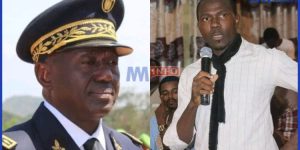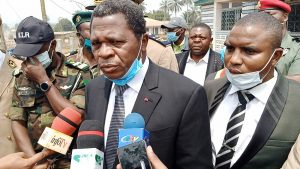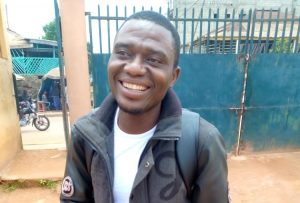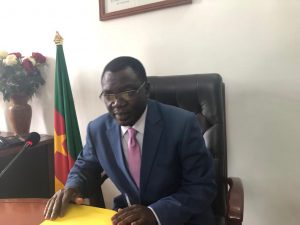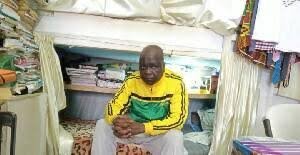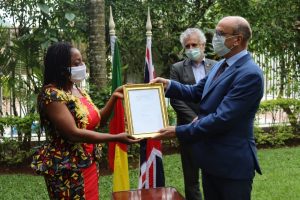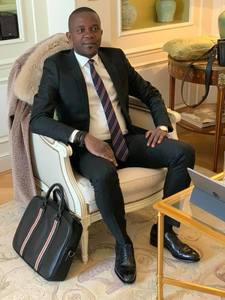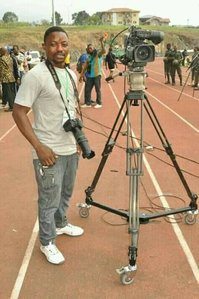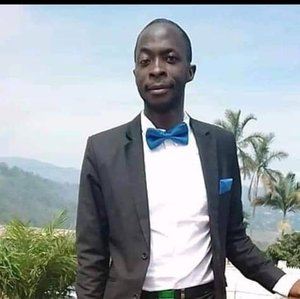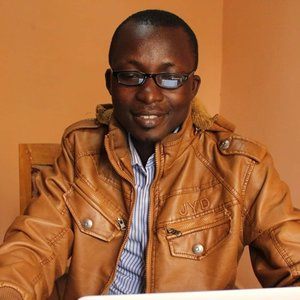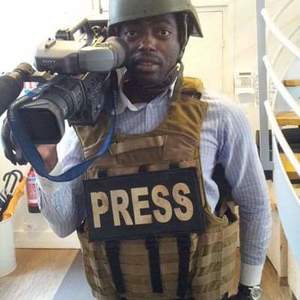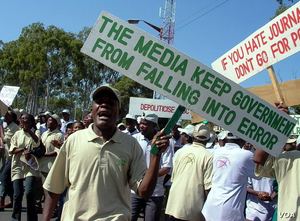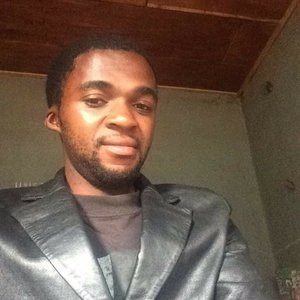A plate of fufu and eru eaten during break, little did these journalists know it could be their last meal as free men.
Cameroon, on the Gulf of Guinea is a central African country ruled for 37 years by President Paul Biya whose policies take the framework of a unitary presidential republic where the president is head of state and head of government.
The country has been ranked by Committee to Protect Journalists (CPJ) as the second worst jailer of journalists in sub-Saharan Africa.
Most of the journalists detained in Cameroon are facing charges linked to false news, fake news and news that endangers state security.
At least 6 of every 10 journalists in the private media actively involved in reporting on the socio-political crisis are either threatened, tortured or detained.
There is no story the government does not follow, they even set apart a monitor team that scouts vocal reports against government authorities and their policies.
The common thing among those targeted journalists ― those still in detention, those on exile and those who continue to live under constant threats ― is that they dared to report stories related to the current crisis rocking the English speaking regions, exposed political authorities, spoke against the violation of human rights, corruption or challenged military acts of killings and arson.
With this escalation of contentious topics, journalists no longer know which red lines they should not cross.
In this narrative, Arrey Bate narrates the story of some Cameroonian journalists in detailed interviews, accounts of persecutions, arrests and imprisonment.
Atia Tilarious Azohnwi

Atia Tilarious Azohnwi is Political Desk Editor for The SUN Newspaper, Cameroon. He doubles as the Buea Chapter President for Cameroon Association of English Speaking Journalists (CAMASEJ).
Atia was first harassed by six military men on Monday January 23, 2017 while distributing newspapers to vendors.Based in Buea, his arrest was ordered by the Police Commissioner of the Second District Police Station, Commissioner Nana Ngongang Roger who later searched his phone, going through messages, pictures, videos, audio recordings, contacts and contents of his USB storage devices.
Kept for over 9 hours that day, the commissioner said he had been told by the mayor of Buea, Ekema Patrick, that he (Atia) had links with Mark Bareta and Tapang Ivo Tanku, Ambazonia activists.
Ambazonia (Amba Land) is the contested territory of former British Southern Cameroons, present two Anglophone regions of Cameroon. It is the nation fighters want to establish in their fight against oppression and marginalisation from the Cameroon government under Paul Biya.
On Thursday February 9, 2017 at about 8pm, Atia was again arrested by an armed police squad led by same Police Commissioner, Nana Ngongang Roger. Following a Tuesday January 17 internet shutdown by the Cameroon government on the two English regions, journalists had to travel at least two hours to access internet from the French Cameroon regions. He had just returned from Douala when the military picked him up.
“Upon our return from Douala, we stood at the entrance to Amos’ home with another colleague, Cham Victor Bama of Eden Newspaper” Amos Fofung and Charm Victor were two colleagues he was discussing with when two pickup vehicles loaded with police officers flashed in front of them. The police had with them a handcuffed and battered Mofor Ndong (publisher of a Bamenda-based Voice of the Voiceless Newspaper whom he was seeing for the first time.
“In fact, it was only on February 10 at the police station that I got to know Mofor” Atia said
When he inquired, the police commissioner told Atia that Mofor was under arrest for having tracts preaching terrorism in his possession. They were all later rounded up and lumped into the police vans for further questioning at the station.
Forced at gunpoint to write a statement about what he knew, Atia was later stripped naked and thrown into a dark unventilated cell sleeping on the dusty bare floor till morning with over 30 other persons in the small 16metres square cell.
With no toilets, detainees had to urinate in bottles and pass out faeces in a bucket that was almost overflowing.
“At about 10am, we were removed from the cell to the holding area, stripped of our shoes and shirts, distraught and shaken. Mofor already had a punctured lip and wounds on his feet and was in cuffs – wounds he later said he sustained from police assault”
The Commissioner said Atia flouted the warning from the Ministry of Post and Telecommunications (MINPOSTEL) against propagating false information by having strike and ghost town-related messages in his phone.
Instituted by separatist fighters, “Ghost town” was a period of total shutdown on all activities including businesses, offices, cars and movements of people in the Anglophone regions. During this period, everyone stays indoors
Atia was quick to point out that he had never forwarded any strike-related message and that he does not have control over who sends him text messages. The commissioner said he should have deleted the messages as soon as he received them.
“I told him that I have always done so except for the ones that came in after my arrest, when my phone was in the commissioner’s keeping.”
Atia and colleague Amos Fofung were accused of feeding the leaders of the outlawed Cameroon Anglophone Civil Society Consortium, CACSC, (Tapang Ivo and Mark Bareta) with information – accusations which they vehemently denied.
Several journalists were present at the scene including the publisher of the Sun Newspaper, Wasso Norbert Binde.
The police commissioner had confided in a private discussion that the matter was above his level, that he was following orders from above. He said several police units were involved in the operation and there was nothing he could do.
“On our way to the judicial police, Police commissioner Nana Ngongang Roger told Amos and I that though I was innocent, some persons want me to be jailed. He said some elites did not like my objectivity and investigative reporting. He concluded by saying that I talk a lot and often times rattle the authorities”- Atia said.
On February 10, 2017 Atia Tilarious was cuffed and thrown behind a military van, to be carried to the Judicial Police Headquarters in Yaoundé. He was put in solitary confinement cell for close to three weeks. All attempts by his lawyers and other concerned individuals to get to him proved futile, officials said they were under strict orders not to let anyone see him.
Hewas held incommunicado with no official charges filed against him yet.
At the Judicial Police Headquarter, the commissioner in charge of our investigation, Police Commissioner Ngom Passam Christian established that he had no connection with Mofor Ndong who was accused of having tracts preaching terrorism.
The comissioner told Amos and Atia that they will be freed soonest.
“He said when I go back, I should report in favour of government and not otherwise. He said I have to appease some elites and authorities through my reporting.”
Without Sun
Typical of the treatment journalists receive when they are arrested, for 55 days at the Judicial Police Atia did not see the sun. He had little lights in the cell round the clock but no ventilation.
“We slept on bare floor. We could not brush our teeth, shave our hair or take a bath. It was a horrifying experience.”
Taken to the Yaoundé Principal Prison in Kondengui, he was put in a cell of 11 persons. Built for 1,500 persons, the Kondengui prison was created in 1967 with a facility of 16 toilets and 400 beds but now harbours more than twice the number and is well noted for the torture and poor conditions.
On July 28, 2017, Atia was charged for being an accomplice to acts of terrorism. They also claimed he had links with Barrister Nkongho Felix Agbor (Agbor Balla), Dr. Fontem Neba, Mark Bareta and Tapang Ivo Tanku who at the time were accused of committing acts of terrorism.
At the prison, visits were restricted. Visitors had to be authorised by the State Prosecutor (french – Commissaire de Government) at the Yaoundé Military Court.
To obtain a visit permit, prospective visitors had to pay FCFA 2,000 and wait for several days to get it signed. The signed permit has a validity of one month and visits were authorised weekly on Tuesdays, Thursdays, Saturdays, and Sundays and on public holidays.
When he fell sick, Atia was told that there were no medication in the prison. He had to pay to get drugs that were meant to be free.
His release came on August 31, 2017 following an August 30, 2017 decision of the Cameroon Head of State Paul Biya to discontinue proceedings agents him and other Anglophones before the Yaoundé Military Tribunal. Though released now, Atia is still trailed wherever he goes.
Mimi Mefo

Mimi Mefo served as English desk editor and news presenter for the privately owned Equinoxe television and radio station. Apart from serving her role as desk editor, Mefo runs Mimi Mefo Info , a news website which is actively reporting on the crisis rocking the two English speaking regions of Cameroon.
On October 31, 2018 she was first served with a convocation to appear before the national gendarmerie in Douala, capital of Cameroon’s Littoral region, to be investigated on false news and cybercrime.
Being a Friday, Mefo’s lawyers petitioned the gendamerie that she attends to the convocation on an early week day. Her lawyers feared that if Mefo was detained on a Friday, she would spend an entire weekend in custody as Cameroon laws do not support release from detention during weekends.
This was granted and her convocation pushed few days ahead.
She contacted her lawyer, barrister Tamfu Richard, who told her that an investigation had been opened against her on propagation of false information and cyber criminality.
“The problem here are actually are my reports, my debates, my social media reports and my day to day, minute by minute updates on my website and social media on political and social issues in Cameroon”
In Cameroon, when journalists report vocally about the atrocities, killings and arson attacks, they get threatened and are labelled as enemies of the state.
On November 7, 2019, Mimi was cuffed and taken to the New Bell prison, accused for publishing fake news and for being a cyber criminal.
Even before her arrest, she had complained about threats over her reporting of unrest in the English-speaking regions.
Questioned for several hours, she later spent 4 days in detention, charged with “publishing and propagating information that infringes on the territorial integrity of the Republic of Cameroon”
She relayed news about the assassination of an American missionary in the North-West region during a gun clash between the military and secessionist forces.
Her report accused the Cameroonian military of killing Charles Wesco in the gun clash and sourced her facts to Cameroon News Agency, another online platform run by journalist Nfor Hanson Nchanji. Nfor at the time had fled out of Cameroon after he too received threats for his reporting and was hunted by the government.
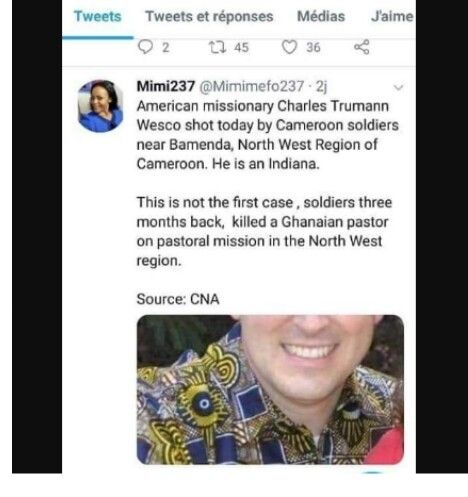
Authorities accused Mefo of publishing false news, she was handcuffed and sent to jail.
She spent four days in prison. They searched through her social media profiles and websites confirming instances of false reports.
While in detention, Mefo’s image was displayed on Equinoxe TV all through the 6pm news report – a still and not a motion picture, suggesting that Mefo who was to read the news was absent – arrested.
Her arrest sparked national and international pressure from diplomatic missions, journalists, press bodies, politicians and a huge media protests.
Cameroon’s then Minister of Communication, Issa Tchiroma Bakary, on Thursday November 8, issued a statement on Mefo’s arrest and detention.
According to Tchiroma, Mefo was arrested for allegedly giving wrong facts on the killing of the American Missionary, Charles Wesco in Bambui, Bamenda of the Northwest Region of Cameroon and was justly held under investigation for misleading the public.
After four days of massive pressure Mefo was miraculously released from the military tribunal on November 2, 2018, all charges against her dropped.
Lead Counsel Barrister Tamfu Richard said proceedings against Mefo had been discontinued on the recommendation of the President, Paul Biya who instructed the minister in charge of military justice to stop legal procedures against her. Her judgement was total acquittal – a “nolle prosequi”.
Shortly after her release, Mefo moved out of Cameroon for fear of further arrest and torture. Shortly after, Mimi Mefo became the winner of Index Cencorship award on press freedom in the journalism category.
Amos Fofung

At the time of his arrest, Amos Fofung Nkunchoh served as Littoral and South West bureau chief of the lone Cameroon English language daily newspaper, The Guardian Post.
Arrested on Thursday February 9, 2017, Fofung was cuffed alongside Political Desk Editor of The Sun newspaper, Atia Tilarious and Mofor Ndong, Publisher of the Bamenda-based newspaper Voice of the Voiceless.
Three of them were transferred to the judicial police headquarters in the Southwest region, where police handcuffed and transported them to Yaoundé in a pick-up vehicle.
He spent more than 5 months in prison without charge or any crime levied on him
Fofung and Atia were discussing by the roadside when two pickup vehicles loaded with police officers flashed in front of them.
The police had with them a handcuff and Mofor Ndong who had just come in to town from Bamenda. The police arrested us without any official complaint or explanation”
Mofor was caught for having a bag of tracts preaching secession and Fofung was indicted for keeping him in his house. Mofor and Atia were taken to court without Fofung on July 14, 2017. It was after this session Amos learnt that he should have been released five months earlier.
“The president of the military tribunal told them that I ought to have been released since April 5 – the same day we were transferred to prison. To her, I was a ‘ghost in prison’,” Fofung said.
While in prison, authorities denied them access to any communication or visits for two weeks.
They were taken to court twice and brought back without anyone asking any question. On one occasion the policemen who accompanied them said the military prosecutor who they ought to have met was on sports. So we were taken back to the police headquarters. The process repeated for months as they stayed in prison under deplorable conditions
Fofung told me he is convinced that his extensive reporting on the Anglophone crisis was the reason behind his arrest. Leaving in Buea, an English town in the heart of the crisis, he had made several reports, travelling to cover stories which were featured on national tv stations like Canal 2 and other international media where he constantly freelanced.
“I was kept in prison for 6 months and one day they just let me go like that. No charges, nothing, only a warning to stop my reporting on the Anglophone crisis. They kept telling me they were investigating me, went through my newspaper publications and social media accounts but found nothing against me” he said.
Fofung was nominated under the Newcomer of the year award category during free press live 2018, a nomination he only heard after his release.
While releasing him, authorities advised him to stay away from reporting as much as he could. They told him that he would return to prison if he didn’t keep his mouth shut. Once Fofung was arrested, he fled from Cameroon to Washington DC – USA.
Achomba Hans Achomba

Achomba Hans Achomba is a Cameroonian documentary filmmaker and photo journalist who has produced over 22 documentaries worldwide covering a range of issues including human rights and politics.
Police arrested Achomba in Bamenda on January 23, 2017.
According to a notice outside the military tribunal offices where Achomba appeared, he was accused of complicity of hostility against the fatherland, a charge he refused all through.
Achomba makes documentaries for the state-run Chinese broadcaster CCTV. At the time of his arrest he was producing a two-part documentary about the Southern Cameroons’ struggle for liberation.
According to a notice that Shiya Lilian (Achomba’s wife) photographed outside the military tribunal offices where Achomba appeared, he was accused of complicity of hostility against the fatherland, secession, propagation of false news, insurrection, incitement to civil war, and complicity in acts of terrorism.
Shiya said that court proceedings were held in French, despite Achomba being an English speaker.
Achomba told me he lived abroad. He only returned to Cameroon for his wedding with Shiya when he was arrested to spend months in prison, delaying his wedding plans.
During his arrest, the soldiers mocked his wedding plans and told him he would not see Shiya anymore. Every week, she would make wanton travels with her pregnancy to see Achomba in prision and make sure his health wasn’t deteriorating.
Detained in Kondengui dungeon in Yaounde, Achomba was arrested after he was seen asking somebody why he was on the streets on a “Ghost Town” day. Untill date, such days are usually characterised by heavy shootings between Ambazonian forces and military forces with records of deaths, arrest and acts of arson.
During questioning, police checked Achomba’s cell phone and saw photographs of him wearing a political t-shirt at a rally called by opposition parliamentarian Joseph Wirba.
Honorable Joseph Wirba is the SDF opposition parliamentarian who took the stage in late 2016 during a parliamentary.
In his speech at the session, Wirba opposed the most recent military acts of beatings, rape and torture of students in the University of Buea.
Wirba warned the government not to use the military on striking lawyers and teachers who were on the streets for their rights. After his celebrated speech, Wirba went viral and he began organising protests and conferences in major Cameroonian cities which the government banned calling it a threat against national security.
Achomba’s arrest was also due to his affiliation to Wirba who was already on the governement bad books.
Achomba told me he was arrested by a mixed group of a scarily armed police officers, gendarmes and military and taken to the Gendarmerie headquarters where he was brutally tortured and thrown into a squeezed stinking cell for two days.
“At about 2:30am on the night of the third day such as I couldn’t even walk, I was chained and a black small bag put over my head, flung into the back of a pick up truck and transferred overnight to Yaounde” – Achomba said.
In Yaounde, he was locked in an underground bunker with no windows, no water and no electricity for six weeks. During this time, he appeared at the Military Tribunal three times.
He was subsequently transferred to the “hellish” (as he describes it) Kondengui Central Prison in Yaounde’ where he spent almost ten months under a deplorable condition and failing health.
He had been working on the release of “Blacked Out”, a narrative of the world’s longest ever recorded internet shutdown suffered by the two minority English-speaking regions of Cameroon. The video documentary featured the plight of internally displaced persons(IDPs) fleeing the war and interviews with several opinion leaders.
Achomba was released after six months in prision, he continued to receive threats once he announced the release of his documentary “Blacked Out” which was almost completed before his arrest.
“I was again threatened, hunted and I had to go into hiding. Things got worse after my interview on the BBC about the documentary. Two senior police and military officers directly declared on me that I will die because of my stupid documentary”
After several threats to his life and family, Achomba fled Cameroon and released Blacked Out
Tim Finnian
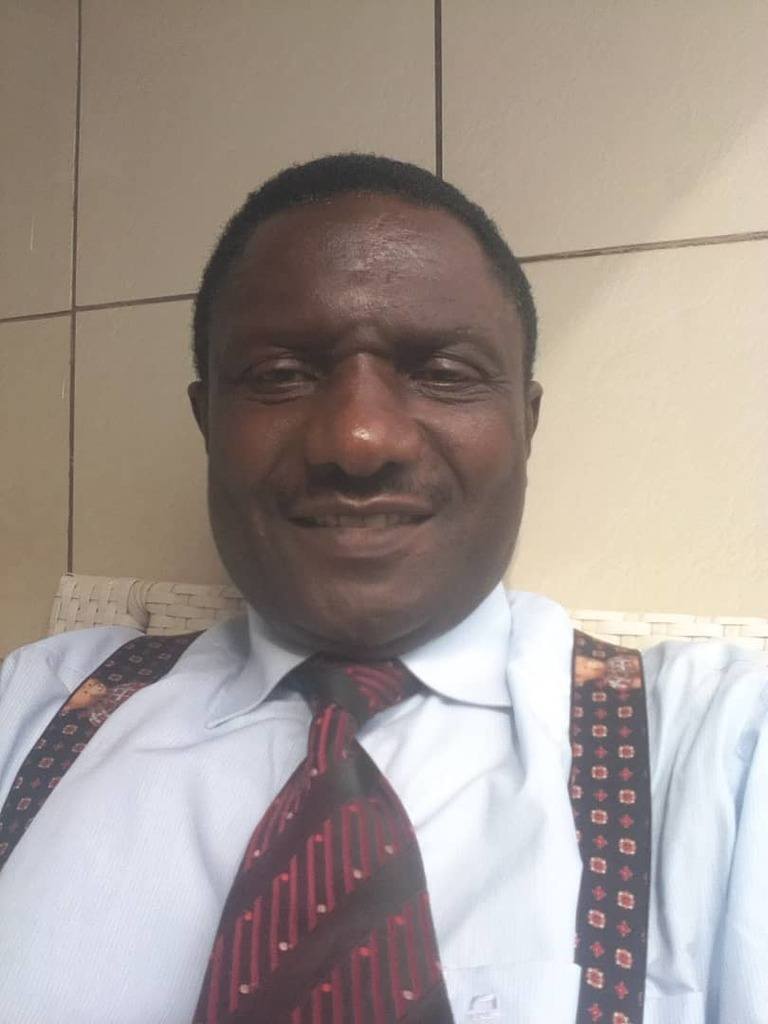
Tim Finnian, Publisher of the Lifetime newspaper was among the first journalists to be arrested at the wake of the Cameroon Anglophone crisis.
On January 26, 2017, Finnian was brutally caught by plain clothes security officers without a warrant and transferred overnight to the gendarmerie headquarters in Yaoundé where he spent 8 months.
He was caught for publishing sensitive information regarding the death of some protesters while they were transferred to Yaoundé by security forces.
Tim’s story talked about a group of protesters who were tortured in Bamenda during a clampdown on protesters. One of them died in a truck while the military transported them to Yaounde.
Tim told me he got his story from a reliable source and published, but the administration had a problem why he published such a story.
Four men dressed in black forced him into a car in Bamenda, which took him to a local police station where officers questioned him about the report.
The military denied him permission to see his wife who was to bring his drugs, as he was on medication.

For four days he was questioned and the military demanded information about the his newspaper and those he worked with.
They asked him why the source gave him the information and whether he was aware the article could incite “civil disobedience”.
Shortly after his arrest, The Lifetime shut down voluntarily as Tim’s absence crippled publication. A military judge charged Tim for acts of terrorism, insurrection, secession, and publication of false information.
Tim told me about his nightmare and prison tale at Kondegui dungeon known for molesting criminals. He drank water drawn from a borehole and faced serious health problems but authorities denied him all access to medical treatment.
After his release, Tim launched The Life Time magazine with focus on investigations and exposing alleged corruption in government and business sectors.
Nfor hanson Nchanji
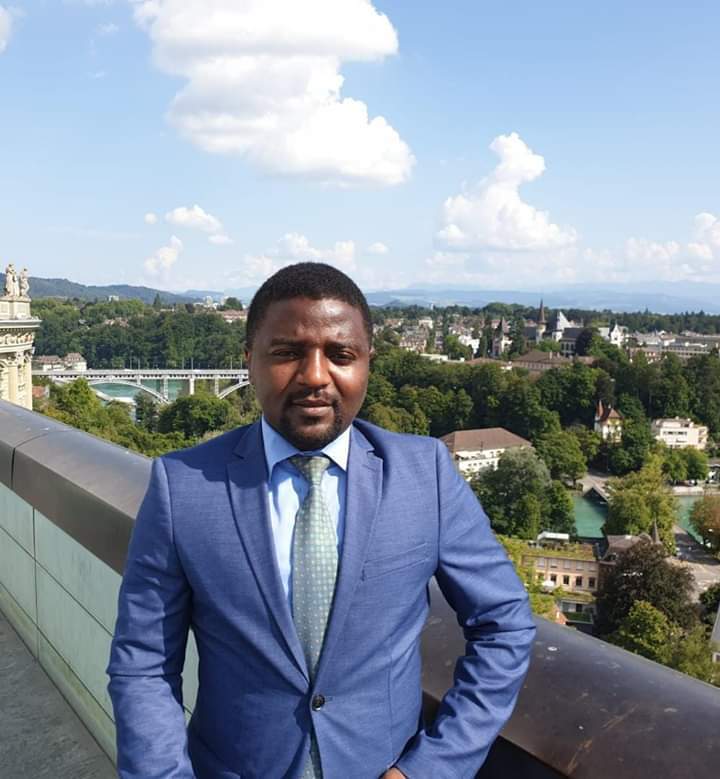
Award winning journalist and human rights defender Nfor Hanson Nchanji remains a thorn to the flesh of government authorities in Cameroon.
He served as English Desk editor for private owned media Equinoxe Tv and radio, and runs the news website Cameroon News Agency
On Sunday August 28, 2016, Nfor was arrested in Muea for interviewing Derrick Jato, another TV journalist who was being detained under unclear circumstances. He was briefly detained and then released after warnings.
Nfor presented “The Inside”, a political program aired on Equinoxe TV which hosted several political authorities and aired daring thoughts about the current socio political crisis in Cameroon. The program featured opposition party leaders like Ayah Paul Abine of the People’s Action Party and Kah Walla of Cameroon People’s Party who were vocal on the crisis and spoke against President Biya’s regime.
The peak of Nfor’s persecution was after an interview with the then minister of communication Issa Tchiroma Bakari.
The minister was making a tour to media houses on the occasion of the Cameroon Anglophone crisis.
While rounding up a live interview with the minister, Nfor posed a follow up question to the minister who was asking the population to stay calm in his last words
“And the military too should stop shooting” he poked the minister who stammered severally.
“How can you say this?” the minister responded to defend the question that military shot civilians
Tchiroma’s response and exclamation to the question posed by the journalist went viral on Cameroon social media and made trends for weeks.
The interview was nicknamed “how can you say this?” and Cameroonians used the slang to refer to both the minister and the journalist on social media – or similar political issues in Cameroon that could be questioned.
Nfor said his interview caused much trouble to the ministry of communication. He later heard that his name was mentioned in an auxiliary meeting at the ministry as one of those to be taken note of.
“I think the minister got humiliated when I made him to stammer. He even made a statement to me and said “so you have now become famous” Nfor said
At a certain point they began to monitor him, they thought he was working with opposition leaders.
“Many of them blocked me on social media. All these was because of my constant writing on the Anglophone crisis”
On November 29, 2017, Nfor was invited by the United Nations as a Panellist at the 10th Forum of UN Minority issues which Opened in Geneva Switzerlandwhere he gave talks on the importance of the participation of youths in peace initiatives and building trust and confidence between people – Case of the Anglophone Crisis in Cameroon.
Due to his vocal reports and appearance at the UN, Nfor received life threats which caused him to resign from his job at Equinoxe.
Early 2018, he fled from Cameroon after numerous failed attacks due to his firm stand to decry torture, human rights abuse, burning and killings of innocent civilians.
“I was monitored. They knew my door and made several visits to my house in my absence, a few weeks before I left Cameroon, I did not spend a night in my home because of fear. I knew I could be killed any night.”
Samuel Wazizi

Popularly called “Hala Ya Matta”, Samuel Wazizi is a pidgin news reporter with Chillen Music and Television (CMTV)
It is nine months since he was forcefully detained by brutal government forces and no one knows if he is still alive
Since his arrest, the 21st Motorised Infantry Battalion of South West jurisdiction has failed to produce him for legal proceedings or issued any statement about his case.
In August 2019, Wazizi was invited by the police in Muea-Buea where he willingly showed up.
He was interrogated on issues of terrorism, spreading information from Ambazonia fighters to threaten the population and because the separatist group set up a camp in his farm.
Wazizi was forcefully detained though he denied all the allegations against him. The police commissioner said he could not grant him bail because the administration of South west “was on the case closely”
The 21st Motorised Infantry Battalion of South West jurisdiction has failed to produce him for legal proceedings even when Barristers Nkea and Edward Lyonga, Lawyers defending him filed a habeas corpus application and were reliably informed that their will be brought to court.
No one has heard from Wazizi and the government has kept a closed mouth over his disappearance
There are high fears that Wazizi has been under severe torture since the Infantry Battalion is said to, by law, have no investigative character, neither any detention centres, but a repressive setting.
But the fears are again beaten by thoughts that he may have been silently eliminated
[Opinion] What Happens To Vocal Journalists In Cameroon: They Get “Killed” For Their Work
He like Paul Chouta, Wawa Jackson and a host of other journalists still in detention have been prey to the waiting hands of the Cameroon government which has often arrested, tortured and intimidated journalists who expose government crockery.
Wawa Jackson
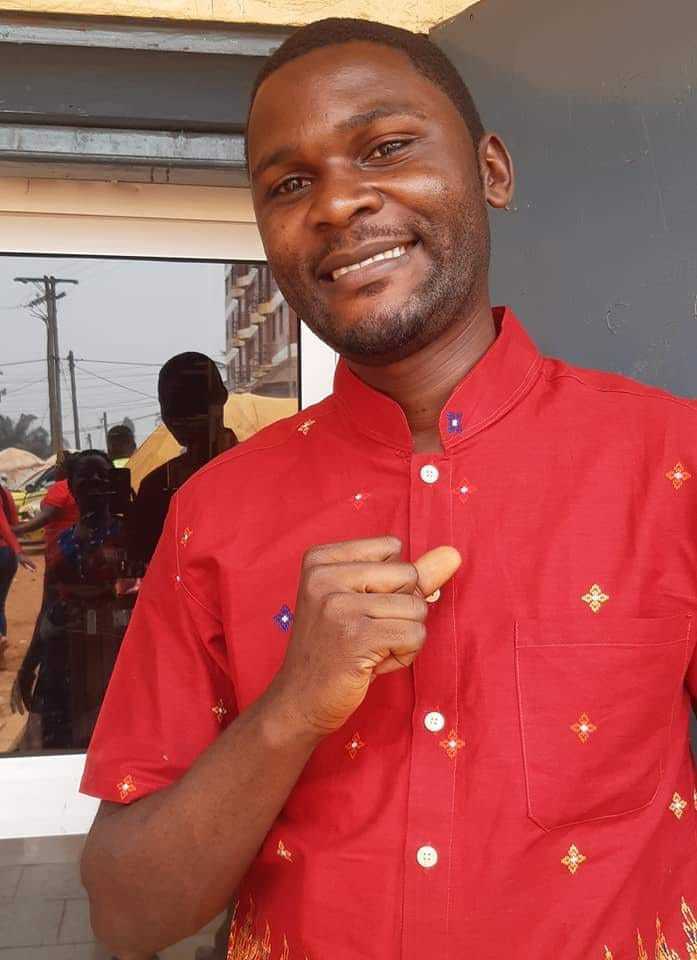
“Arrested” without any warrant, Bamenda based journalist Wawa Jackson Nfor has been detained since May 2018.
Picked up by some gendarmes from the Nkambe brigade, Jackson is one of the many journalists still incarcerated as a sufferer of decaying press freedom in Cameroon.
When President Paul Biya ordered the “discontinuance of proceedings pending before Military tribunals, against 333 persons arrested for misdemeanors, in connection with the crisis in the North-West and South-West Regions”, hopes were that Jackson will be freed as his case was pending before the court since May last year.
Being tried for publishing successionist information, Jackson has appeared in court more than thirty times. He would later be held incommunicado in a torture facility in Nkambe.
Wawa Jackson has pleaded not guilty but the State prosecutors on his case have refused to let him go.
A bail application filed by the defense counsel, Barrister Ngwang Shey , was outrightly turned down by the presiding judge, Justice Bup Stanley.
Barrister Ngwang challenged the court to choose between the defendant whose rights have been violated or the violator.
After listening to the arguments advanced by the defense counsel with contention from the state prosecutor; the presiding judge requested a reasonable length of time to pass his judgment.
In about four sessions he kept promising that he is still working on the judgements.
In June last year, Justice Bup Stanley took an uncertain leave and it is still uncertain when the case will resume.
Jackson Nfor is a journalist based in Bamenda, headquarters of the North West region of Cameroon. He is detained at the Nkambe principal prison.
Mancho Bibixy
One of those still in detention is Mancho Bibixy, a former radio broadcaster sentenced to 15 years in prison.
Nicknamed the “coffin revolution leader”, Mancho was arrested after making a public speech in a coffin in November 2016.
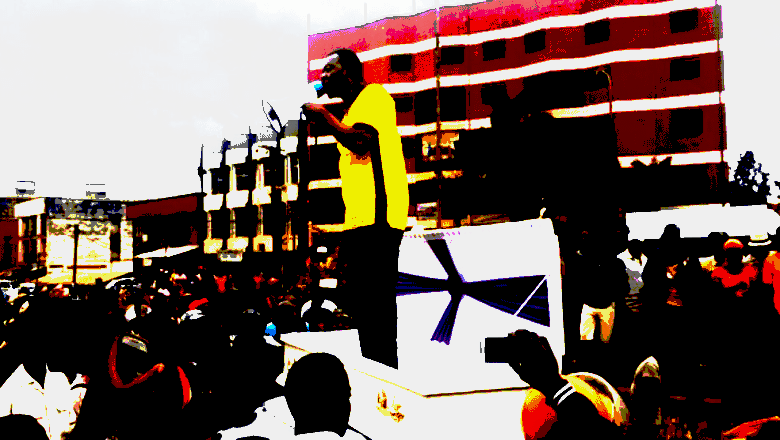
Mancho Bibixy, Leader of coffin Revolution
He called attention to the Biya administration’s violent response to Anglophone protesters, and the mass detentions.
He was harassed for weeks over his radio show content before permanently detained in June 201 and was found guilty of terrorism, secession and insurrection.
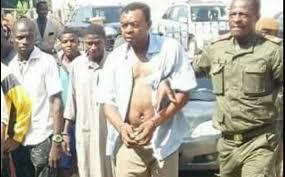
Mancho Bibixy, leader of coffin Revolution being escorted to court by military
Decaying Press freedom
Several political journalists in Cameroon either work in fear of angering the authorities, or take the opposite route to praise the government.
The regime has built a solid crackdown on media establishments preventing journalists from reporting the numerous atrocities committed by the military.
The brutal military is the hammer used to chisel reporters and columnists whose reporting do not favour government authorities.
Journalists often complain that their families are also placed under a secret service surveillance which makes life difficult as they are being avoided by friends who fear being a target. Hard stories can only be told by exiled journalists who continue to operate in defiance of government sanctions.
With many journalists now scared of reporting, there are fears that the most critical stories in the Anglophone regions of Cameroon will go unreported.
Atleast 8 Journalists are still in detention including Paul Chouta in Kondengui’s Principal Prison since May 28, 2019.
Since 2017, we have staked our lives to provide tailor-made news reports to our readers from war zones and hot political rivalries in Cameroon - And we do so for FREE.
As a small online media now reaching over 100,000 monthly readers on all our platforms, we have to rely on hiring a small team to help keep you informed
The best way to support our online reporting is by considering a measly sum for our team on the ground as little as $1. Now you can make a donation to us below, it only takes one click...
[sdonations]1[/sdonations]




